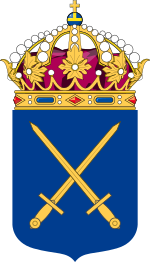Swedish Army
| Swedish Army | |
|---|---|

Coat of arms of The Swedish Army
|
|
| Founded | 1521 |
| Country |
|
| Allegiance |
The Government in the name of King Carl XVI Gustav |
| Type | Army |
| Part of |
|
| March | "Svenska arméns paradmarsch" |
| Engagements |
Swedish War of Liberation Danish Count's Feud Great Russian War Northern Seven Years' War Livonian War Russo-Swedish War (1590–1595) War against Sigismund Polish War De la Gardie Campaign Ingrian War Kalmar War Thirty Years' War Torstenson War First Bremian War Second Northern War Second Bremian War Scanian War Great Northern War Hats' Russian War Seven Years' War Gustav III's Russian War First Barbary War War of the Fourth Coalition Finnish War War of the Sixth Coalition Campaign against Norway War in Afghanistan 2011 Libyan civil war |
| Commanders | |
| Chief of Army | Karl Engelbrektson |
The Swedish Army (Swedish: Armén) is a branch of the Swedish Armed Forces in which its main responsibility is land operations. The Swedish Army is attached to the Northern European Command and SJF.
The peace-time organization of the Swedish Army is divided into a number of regiments for the different branches. The number of active regiments has been reduced since the end of the Cold War. The regiment forms training organisations that train the various battalions of the army and home guard.
The Swedish Armed Forces recently underwent a transformation from conscription-based recruitment to a professional defense organisation. This is part of a larger goal to abandon the mass army from the Cold War and develop an army better suited to modern maneuver warfare and at the same time retain a higher readiness. Since 2014, the Swedish army has had around 50,000 soldiers in either full-time or part-time duty, with eight mechanized infantry battalions instantly available at any time and the full force of 71 battalions ready to be deployed within one week. The regular army consists of 8 mechanized maneuver battalions, 19 support battalions of different kinds including artillery battalions, anti-aircraft battalions, combat engineer battalions, rangers, logistics battalions and 4 reserve heavy armored battalions and 40 territorial defense battalions. The battalion is the core unit but all units are completely modular and can be arranged in combat teams from company to brigade level with different units depending on the task. There are a total of 6 permanent staffs under the central command capable of handling large battlegroups, 4 regional staffs and 2 brigade staffs.
Until 1975 the Swedish monarch was the formal head of the army. In 1937, the staff agency Chief of the Army (Swedish: Chefen för armén, CA) was created to lead the army in peace time. Following a larger reorganization of the Swedish Armed Forces in 1994, CA ceased to exist as an independent agency. Instead, the post Chief of Army Staff (Swedish: Chefen för arméledningen) was created at the then newly instituted Swedish Armed Forces Headquarters (Swedish: Högkvarteret, HKV).
...
Wikipedia
